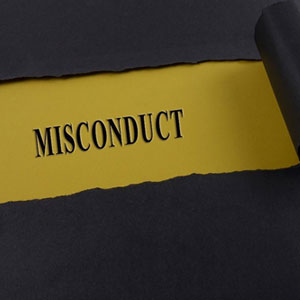Prosecutorial Misconduct In Sex Crime Appeals
 Reviewing Claims Of Prosecutorial Misconduct In Sex Crime Conviction Appeals
Reviewing Claims Of Prosecutorial Misconduct In Sex Crime Conviction Appeals
Prosecutorial misconduct has traditionally been a challenging issue to litigate in any appeal, including sex crime appeals. As per the Michigan Rules of Professional Conduct, all lawyers, including prosecutors, must adhere to professional ethics. Due to their unique role in the criminal justice system, prosecutors bear an additional level of responsibility – they are supposed to be obligated by law to pursue justice, not simply to secure convictions. This responsibility is expressly codified in the Michigan Rules of Professional Conduct.
Prosecutorial misconduct should best be viewed as a useful secondary or supplemental issue in appeals. Winning on this issue alone can be very difficult because our adversarial system grants prosecutors considerable latitude in zealously advocating for their client – the people of the State of Michigan. Courts are usually reluctant to hinder this zealous advocacy given that it is the basis for our confrontational system.
As the criminal justice system, and specifically, sex crime prosecutions, becomes increasingly confrontational, the occurrence of alleged prosecutorial misconduct is on the rise. However, due to courts’ reluctance to curtail zealous prosecution, rulings that identify prosecutorial misconduct are not growing at the same rate.
Instances of prosecutorial misconduct may include making unlawful arguments, urging the jury to rely on emotion or sympathy for the alleged victim, posing questions without a factual basis, instructing witnesses to present inadmissible information in front of the jury, making improper or illegal closing arguments, or using so-called “civics arguments,” such as encouraging the jury to consider what they would want if they were the alleged victim. It can also involve withholding exculpatory evidence, i.e., not providing the defense with evidence that supports the defendant’s innocence.
Even though such instances are on the rise, the Court of Appeals and the Michigan Supreme Court often hesitate to reign in this zealous advocacy. Therefore, prosecutorial misconduct is best approached as a supplementary issue in an appeal, bolstering a primary issue such as ineffective assistance of counsel, a constitutional matter like the right to confrontation, or an incorrect evidentiary or other legal ruling by the judge.
While prosecutorial misconduct can significantly strengthen a main issue in an appeal, it is infrequently sufficient on its own to cause a court to overturn a conviction and order a new trial.
Timeframe For A Sex Crime Conviction Appeal Process
The appeals process typically takes longer than most clients anticipate, and it is not uncommon for it to extend well over a year or more. Here’s a general idea of the timeline:
After the defendant’s sentence, there is a 42-day window to file a claim of appeal, marking the start of the appeal timeline. The Appellant (the party filing the appeal – typically the defendant) then orders the transcripts, which can take a considerable, albeit undefined, amount of time to complete – often several months.
Once the transcripts are ready, the court reporter will file them (along with a certificate that they are completed) with the court of appeals. At this point, the clock starts ticking for the Appellant to submit their brief. Initially, the deadline for this submission is 56 days, although extensions are often requested and granted by either stipulation or motion.
Following the submission of the Appellant’s brief, the Appellee (the party opposing the appeal – typically the prosecutor) is given a period of time to file their response.
From the defendant’s sentencing to the oral argument before the Court of Appeals, it’s quite common for a year or more to pass. This timeframe can lengthen by an additional six months or more if a motion for a new trial is filed, requesting an evidentiary hearing on issues such as ineffective assistance of counsel. Similarly, filing a motion for remand in the Court of Appeals, requesting that the trial judge hold an evidentiary hearing, will further extend the timeline.
If the Court of Appeals’ decision is unfavorable, an application for leave to appeal to the Michigan Supreme Court can add another nine to twelve months to the process.
Post-conviction collateral attacks on a sex crimes conviction, such as a 6,500 motion in state court or a 2254 habeas petition in federal court, can take even longer. There is no specific timeframe for a state court judge to rule on a 6,500 motion, and it’s not unusual for federal habeas petitions or state 6,500 petitions to wait before a trial judge for one or two years before a decision is rendered.
In conclusion, there is no “typical” timeframe for this process, and it can take significantly longer than initially expected. Clients should be prepared for each stage of a post-conviction appeal to take a year or more.
For more information on Prosecutorial Misconduct In Sex Crime Appeals, a free initial consultation is your next best step. Get the information and legal answers you are seeking by calling (248) 509-0056 today.

Call Today For Your Free Case Strategy Session
(248) 509-0056

 Reviewing Claims Of Prosecutorial Misconduct In Sex Crime Conviction Appeals
Reviewing Claims Of Prosecutorial Misconduct In Sex Crime Conviction Appeals